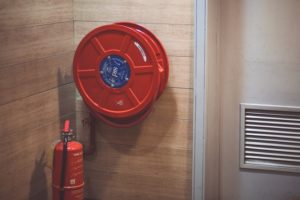
Fire safety is no joke
Fire safety is no joke. If you’re a business owner, you have a lot of responsibility on your hands. Not only do you have the duty of making sure your business stays afloat, but you also have the job of keeping your employees safe. Being knowledgeable is powerful. Here are a few fire safety terms that business owners should know. If you do, then go ahead and pat yourself on the back. Knowing these terms will put you that much closer to running a safer business.
Term #1: NFPA
The National Fire Protection Agency (NFPA) is an association that creates and maintains fire safety standards and codes. These codes help eliminate death, injury, property, and economic loss from fire, electrical, and other hazards. Through research, training, advocacy, outreach, and education, the NFPA delivers information.
Term #2: Wet Pipe Fire Sprinkler System
Two weeks ago, we asked if you could name the different types of fire sprinkler systems. Do you remember what this one means? If not, we’ll remind you again. A wet pipe fire sprinkler system uses a water supply to fight fires. These pipes are full of water at all times so that when a fire breaks out, the sprinklers can extinguish the fire immediately.
Term #3: Dry Pipe Fire Sprinkler System
The water source for a dry pipe fire sprinkler system is under pressure at a sprinkler valve. These pipes are dry and use compressed air or nitrogen. When a fire sprinkler deploys, the air releases, and then opens the valve so that water can spray. A dry pipe works when there are freezing conditions or a building doesn’t have heat, as in the case of many warehouses.
Term #4: Clean Agent
Clean agents don’t utilize the use of water. Thes systems are often in museums, data centers, or any building where electronic equipment should not get wet. A clean agent system releases gas to reduce the amount of oxygen in the room because oxygen feeds flames and causes a fire to spread.
Term #5: Backflow Preventer
Backflow preventers are necessary to protect the water supply in fire sprinkler systems. Liquid, gas, and suspended solids can contaminate clean water in connection systems. A backflow preventer stops this from happening. They keep you and your team safe from contaminated water.
Congratulations! Now that you know and understand these terms, you’re one step closer to understanding fire safety. Do you want to make learning about fire safety fun? Make a guide for your team and then test them the following week.
Commercial and Residential Fire Prevention from Judd Fire Protection
If you want to ensure your home and business are safe throughout the year, trust Judd Fire Protection, LLC. We have over two decades of experience in designing, installing, inspecting, and repairing residential and commercial fire protection systems. We serve clients throughout Maryland, Pennsylvania, Washington, D.C., Virginia, and West Virginia. If you are interested in finding out more about our services and protecting your home and business, give us a call at 410-871-3480 or contact us online. For more fire safety tips, follow us on Facebook, Twitter, and Pinterest.
